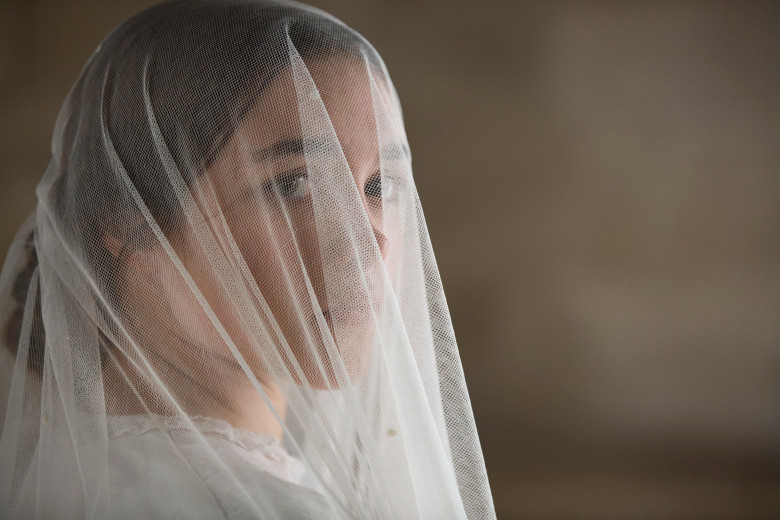Lady Macbeth has all the corsets, high tea and the stifling social mores of the traditional period drama. But the heroine of this adaptation of a 19th century novel (no relation to the Shakespearean drama) is a woman quite unlike the kind you’d find in a Sunday evening BBC drama.
In Lady Macbeth, Florence plays Katherine, a 17-year-old girl sold into a sexless marriage in Victorian era Northumberland. But instead of passively accepting the shame doled out by her impotent husband and cranky old father-in-law, Katherine breaks the rules of engagement in spectacular style. Katherine takes the estate’s groomsman as her lover and plots to rid herself of those new relations.
It’s an arrestingly contemporary take on the period piece, powered by Florence’s sexually charged performance. For the 21-year-old from Oxfordshire, the key to understanding her character is to forget what you know about period drama.
“For me Katherine was never someone from that era,” says Florence when i-D meets her in London ahead of the film’s release. “She didn’t come across as someone who cared. Period films tend to show people who cared about a lot of bizarre things that no one would care about now, like drinking tea in the tea room in a specific tea drinking dress. I don’t think Katherine ever cared about that. She’s a very modern woman but in a very specific time in history.”
And Lady Macbeth is a very different kind of period drama in other ways. The film foregoes lavish estates for a stark minimalist setting. Unbridled passion is very much on the agenda once Katherine meets groomsman, Sebastian (Cosmo Jarvis). Their sex is unexpected and wild but for the actress playing Katherine, it absolutely made sense.
“The fact she doesn’t think sex is scandalous is brilliant,” Florence says. “I like how everyone is shocked that she enjoyed sex as if women didn’t back then. We’ve been conditioned to see the things we see. But she’s a 17-year-old girl who has been left alone in a house with a hunky dude, put that in this day and age and maybe we’d think something would happen. Well why wouldn’t it happen back then?”
Florence has previous in playing provocative teenagers, though. She broke out in Carol Morley’s The Falling, playing a sexually precocious schoolgirl who sparks mass hysteria with unexplained fainting fits. The supporting role impacted enough to net her a best newcomer nomination at the London Film Festival. It’s a promise she’s made good on with Lady Macbeth, which has already scored her a BAFTA Breakthrough Brit Award. All of this has left no time for Florence’s other passion as a singer songwriter. It’s something that looks set to continue with her next, very different role playing real life WWE fighter Paige.
The film, Fighting with My Family, has just wrapped production and Florence is suitably enthused about her part. “Paige went from Norwich to Florida and became a wrestling superstar,” she explains. “The story is amazing and barmy and the family, the Knights, are amazing characters. It was epic because I got to wrestle and kick people.”
It also meant going from corset wearing Victorian era to being Lycra clad in modern pyrotechnic America. But Florence could see the links between them, despite the different worlds. “Paige as a character is unlike Lady Macbeth but still a woman who fights and hates being boxed in,” she says.
There is another striking element of Lady Macbeth that sets it apart from the period drama we know: it includes a number of black characters. Katherine’s maid Anna, and the groomsman, Sebastian are both people of colour. But it’s their rank as servant class that puts these two in jeopardy as Katherine uses her own privilege to get what she wants.
While it’s tempting to interpret Lady Macbeth in a very modern way, seeing intersections of privilege between class, gender and colour, this might be a read too far given that the characters were cast colour blind. For Florence, it is less about tiers of privilege than a woman who turns victim to aggressor in era defying fashion.
“Katherine simply reacts as she’s always reacted. She’s been poked, it hurts so she throws them under the bus. She’s acting out. She’s manipulated people, harmed others throughout the film. But we expect her to just accept it at some point. She’s going to do what she’s always done, which is to protect herself. She does it as coolly as ever.”
Lady Macbeth is in cinemas from 28 April.
Credits
Text Colin Crummy
